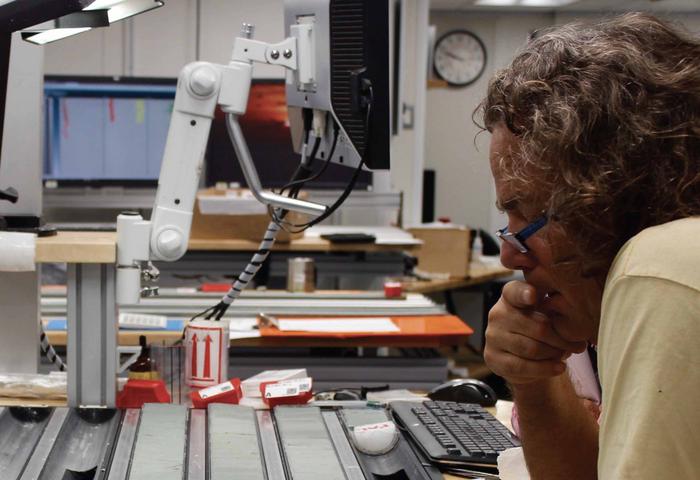An analysis of oxygen levels in Earth’s oceans may provide some rare, good news about the health of the seas in a future, globally warmed world.

Credit: Courtesy, Yair Rosenthal, Rutgers University
An analysis of oxygen levels in Earth’s oceans may provide some rare, good news about the health of the seas in a future, globally warmed world.
A Rutgers-led study published in Nature analyzing ocean sediment shows that ocean oxygen levels in a key area were higher during the Miocene warm period, some 16 million years ago when the Earth’s temperature was hotter than it is today.
In recent decades, levels of life-sustaining oxygen in the ocean have been decreasing, raising concerns that oxygen-deficient zones in key parts of the world oceans will expand, further harming marine life.
Scientists have attributed the trend to climate change-induced rising temperatures, which affect the amount of oxygen that can be absorbed from the atmosphere.
“Our study shows that the eastern equatorial Pacific, which today is home to the largest oxygen-deficient zone in the oceans, was well oxygenated during the Miocene warm period, despite the fact that global temperatures at that time were higher than at present,” said Anya Hess, the lead author of the study and a Rutgers doctoral student working with Yair Rosenthal, a Distinguished Professor focused on marine and Earth sciences with the Rutgers School of Art and Sciences and the School of Environmental and Biological Sciences.
Hess added: “This suggests that current oxygen loss may ultimately reverse.”
The fastest rates of oxygen loss in recent decades have been in oxygen-deficient zones, and they are expected to continue to expand and become shallower, threatening fisheries by shrinking fish habitat. However, climate models diverge in their predictions of how these zones will respond beyond the year 2100, inspiring the team to investigate more.
To test current climate models, researchers chose the mid-Miocene, when climate conditions were similar to those predicted for the next few centuries in the current era of climate change. Researchers examined ocean sediments deposited during the mid-Miocene in the eastern equatorial Pacific. The sediments were recovered from the seafloor by scientists aboard the National Science Foundation-funded research vessel JOIDES Resolution as part of what is now known as the International Ocean Discovery Program (IODP).
The researchers isolated the fossilized remains of microorganisms the size of individual grains of sand that live in the water column called foraminifera. The scientists analyzed the chemical composition of the foraminifera, which reflects the chemical profile of the ancient ocean. They discerned oxygen levels of ancient oceans in a few ways, including using isotopes of nitrogen – forms of the element that have a different relative atomic mass – as detectors. The isotopes are sensitive to a process called denitrification that only occurs at very low oxygen levels. They also employed a method of analysis that compares levels of iodine and calcium and gives subtle readings that can differentiate between well-oxygenated conditions and moderately well-oxygenated conditions.
The methods showed the area was well oxygenated during the height of Miocene warmth, even approaching modern day levels seen in the open-ocean South Pacific.
“These results were unexpected and suggest that the solubility-driven loss of oxygen that has occurred in recent decades is not the end of the story for oxygen’s response to climate change,” Rosenthal said.
Other authors on the study include Ken Miller, a Distinguished Professor in the Department of Earth and Planetary Sciences in the Rutgers School of Arts and Sciences, Alexandra Auderset and Alfredo Martinez-Garcia of the Max Planck Institute for Chemistry in Germany, Daniel Sigman of Princeton University and Xiaoli Zhou of Tongji University in China.
Journal
Nature
DOI
10.1038/s41586-023-06104-6
Method of Research
Observational study
Subject of Research
Not applicable
Article Title
A well-oxygenated eastern tropical Pacific during the warm Miocene
Article Publication Date
28-Jun-2023
COI Statement
The authors declare no competing interests.




